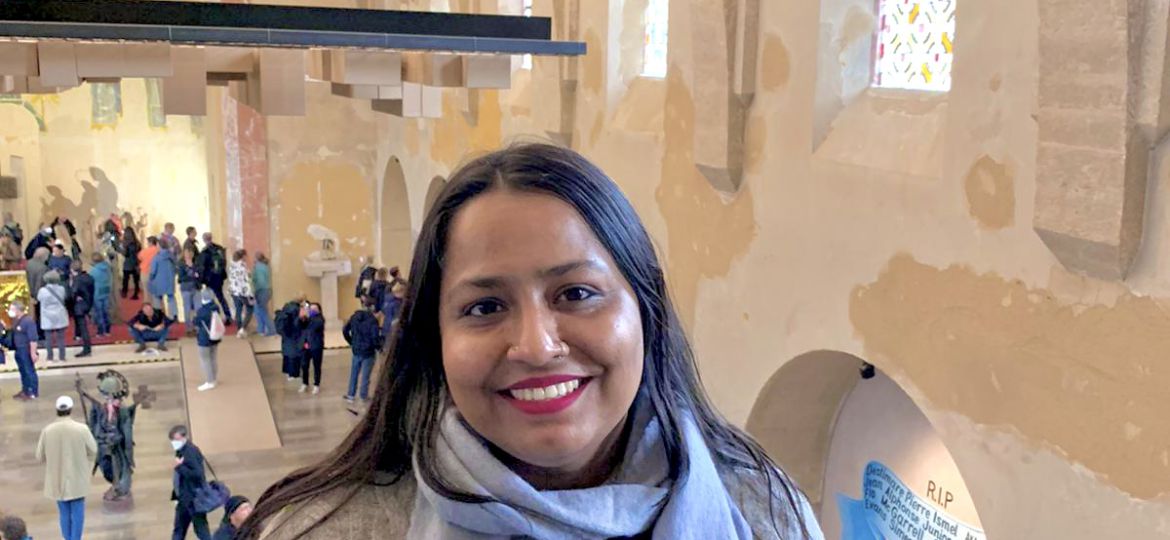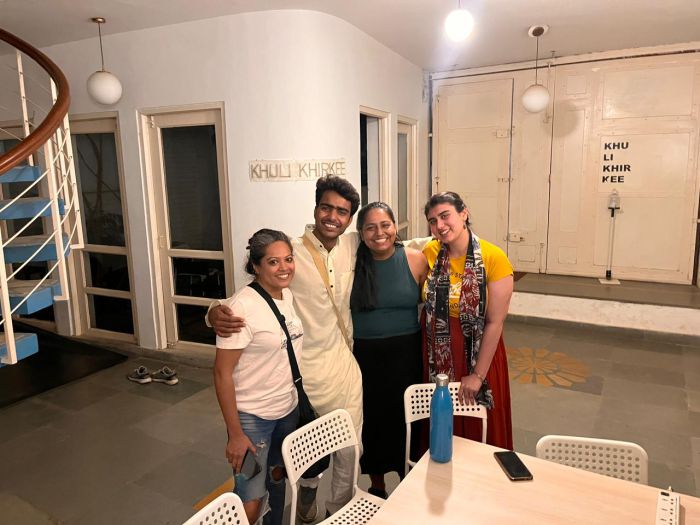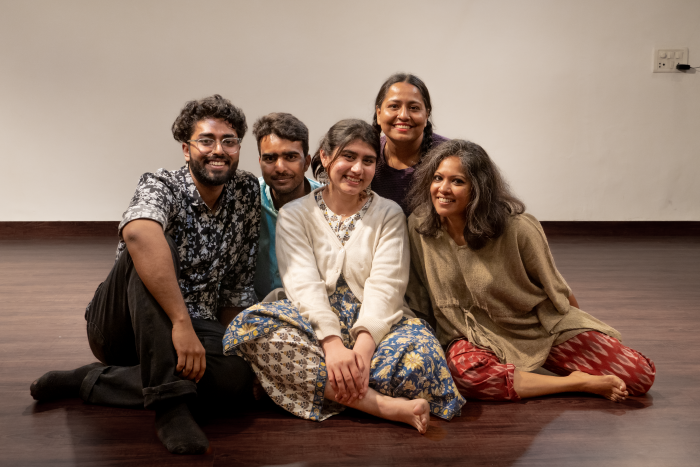
Jyotsna Siddharth is an artist, actor, activist and writer who has been working on DEI (Diversity, Equity, Inclusion) with non-profit, corporate and philanthropic organisations. Jyotsna’s practice spreads across institutional building, intersectionality, arts, activism, theatre, films and development. They have been supporting and advising several organisations, art and social collectives, on strengthening gender, intersectionality, anti-caste, queer, minority rights, race and disabilities perspectives in India and other countries. Presently they are Country Director for Gender at Work India, a non-profit organisation focusing on issues of diversity, equity and inclusion. Jyotsna recently featured in the Linkedin Top Voice for Social Impact. They have a Master’s in Development Studies from TISS Mumbai, studied Social Anthropology from School of Oriental and African Studies, London and are a recipient of the Chevening Scholarship, British High Commission (2014). In 2023, Jyotsna was Cosmopolitan Blogger’s Award Nominee for Dalit Feminism Archive. They are also a peer advisor to Feminism in India, The Rights Collective UK, Giving Tuesdays India and CPA Project.
Shikha Aleya (SA): Hi Jyotsna, so happy to have you in this issue of In Plainspeak! Thank you very much for the time and energy you are giving to this interview. Diving straight in to the theme: to view the body using the frameworks of caste, and of intersectional identities, what has this revealed to you?
Jyotsna Siddharth (JS): Thank you for having me as part of the In Plainspeak series. This is a very central question in my practice and work. When we are born, we are immediately given our identities by default. We are assigned other identities and labels, primarily of caste and gender in the context of India and South Asia.
Our bodies are the vessels through which we feel, emote, work or navigate our societies and the world at large. Our bodies are the real, live archive of everything we have experienced and they have borne the consequences of our social conditioning and decisions. When it comes to caste, gender and other identities of faith, sexualities and disabilities – the body becomes the central point. It is our history, our present and our tool to create the individual and collective futures we wish to build and transform, and to also transform ourselves in that process. For example, whether in cases, events, moments of interpersonal or collective conflict, violence, grief, violations or love, consent or joy – our body takes centre stage. It is critical therefore, to understand our bodies as a tool for individual and systemic transformation of power, freedoms and mutual accountabilities. It is significant that we practice our intellectual frameworks, values and principles actively on ourselves and with other people. We must pay attention to developing deeper understandings about our bodies, how they function, what our personal boundaries are, the negotiations that lie in front of us to engage or to disrupt familial and societal boundaries. It is only then we can perhaps begin to understand societal boundaries in practice and possible ways to subvert them.
Since many of us come from deep-rooted trauma, pain and hurt, it begins to show up in our work, in our interactions with other people unless we actively work to address it. To heal and live your own life on your own terms with no or minimal damage to others often carves a niche path for us and there is no bigger resistance than that. In the capitalistic cultures that reward you for abandoning your body and mind through instant gratification, performing your trauma and hurt, claiming your own personal power and agency with responsibility for one’s own life, shift the social conditioning that has been so ingrained in us. We need to rediscover and re-parent our bodies to break the cyclic nature of intergenerational violence and abuse that people from minority backgrounds experience. In order to do so, we need to create space to connect with ourselves on a deeper level, approach ourselves with curiosity and willingness to do this exhausting but important emotional and self-work. Only then, we are able to understand the individual agency, power and responsibility that we have and hold through our presence and work in our families, communities, and organisations, and in the world.

SA: In your lived experience, what is the impact of this on sexuality, safety, pleasure and self-acceptance?
JS: In my lived experience and life and through my work, I have been noticing an erosion of our psychic and bodily wisdom and autonomy. Our discourses around sexuality, safety, pleasure and self-acceptance have become individualistic in nature with almost no or minimal correlation with the heteronormative, capitalistic and casteist systems, processes, structural barriers operating within our society. At the moment in our society, we don’t have a collective acceptance and understanding about people’s agency, consent and accountability. We have internalised systemic angst and the state narrative which has seeped into how we operate in society. We do not know yet how to coexist without violating or oppressing one another. There is something seriously broken which cannot be repaired unless we align our heart, body, mind to be in tune with those of others.
We often feel we don’t have spaces for a dialogue, to rest or to work collectively but the question that I am confronted with is – who will create these spaces? What do those spaces look like that can hold individual and collective dissonance for everyone? How do we build spaces and patience for mistakes, failures and disappointments? Who will build the spaces for rest and dialogue? Who will cultivate the culture of listening, pausing and working slowly with mindfulness? We all want to arrive already to such spaces; however, to be able to build such spaces for ourselves, and others, is the real work we all have in front of us. We need to learn and teach about sexuality, safety, pleasure and self-acceptance in our socio-political contexts and the openness that’s required to work through such socio-political tensions.
The work I have been doing in different spaces is to reaffirm the fact that we do not need to violate, oppress or be overbearing with our own ideas and ways of looking at the world. I have been working with various institutions in different capacities to inform intentional and mindful ways of working which recognise individual capacities, agency and approaches to working. My work is therefore to be able to hold views and tensions – to find many different ways of feeling, being, working and coexisting with one another.
SA: Jyotsna, you have an understanding of love as a “radical, political tool to come together to build better individuals, relationships, communities, and society”. What have you seen happen, when we bring the concept of love into conversations about rights? Such as you have done on social media as well.
JS: We live in a very harsh, brutal and difficult society. We are often fed and expected to resort to a language of violence, rudeness and anger. This is mostly systemic but finds its way into our minds and bodies. If we wish to shift the discourse – we have the tools at our disposal waiting for us to understand and learn. For me, love and spirituality are two of those many tools that help me find compassion for myself and people I live, love or work with. When you talk about love in socio-political spaces, you put forward humanity and a feminist manner of engaging with people. More than ever, it is important that we make ourselves learn by consciously moving away from toxic, stereotypically accepted as masculine ways of speaking and working with one another. It is vital that we teach ourselves to speak gently, lovingly, develop patience even with people that hurt us, disappoint or violate us, as those are the ways of transformative restorative justice, the feminist ways of engaging. As we are surrounded by violence and rage, it is crucial we continue to bring ourselves back to our bodies by centring and grounding to operate from the space of our own power and love. I believe that people who hurt us or violate us are in dire need of help and are hurting themselves. It is a constant projection of their own insecurities and trauma that is manifested through crimes, violence and apathy. We give people what we have or cultivate within ourselves, whether it is hate or love.
Through Project Anti-Caste Love, the first digital project that started to build a discourse on caste, love, sexuality and faith, I have learnt and grown immensely through a humble, organic interaction with many people. I have received much love from people who have been following the project for a while. By talking to many, many young and old people, through the love letters series – I was able to reaffirm the value of centring love in all our political discussions. I am grateful that over the years, people have put in their love, support and vulnerabilities to share those stories where it became difficult for them to operate from the binaries of right and wrong. Human beings and their lives are grey and therefore the only way we can truly understand and shift our societies is by loving one another beyond our own biases, judgments or mistakes. By building compassion for ourselves, and the other, and releasing each other from the toxic, Brahmanical, masculine and incarcerating ways in which our society functions.

SA: Thank you for that powerful and crucial message. This post on Instagram gives a glimpse into rehearsals and prep for your new performance project, Clay. There is a reference to bodies with this description, “fully free, uninhibited and fearless”. If one is not an actor, performer, or activist, with the opportunity to practice, and the legitimacy these spaces help create, where does one begin to love and understand one’s own body?
JS: This is subjective. In my view, we need to go back to our bodies, minds and heart and ask all those questions we fear, resist or escape from. If resources and space allow, we need to create spaces for ourselves to tune in with our bodies, connect with our breath, exercise and practice living mindfully. It is excruciatingly difficult as some of us may not have our own space or we may be living with families, but that’s the work we need to do for ourselves. To take stock of what our present reality is, how much we are able to do or contend with without losing a sense of or disassociating from our own body.
I have lived with dysphoria for the longest time before I even had the vocabulary for it. My own dysphoria has emerged both from my own sexuality as well as the caste location I come from that created a feeling of dissociation among peers. Until I started working with the deep teachings of spirituality, embodied practice, somatic and physical theatre, I did not pay attention to the inner wisdom that my body had always had. This is what the caste system or any kind of systemic power does. It corrodes our bodies, psyche and eventually breaks our soul. If we don’t feel at home or create safety for ourselves, we will not be able to hold space for ourselves and others, let alone for difficult circumstances that life may throw at us.
The play I am working on at the moment is called Clay. It is a metaphor for the body and the cyclic nature of life and death and how the dalit community is at the frontline of transforming this spiritual experience of the human body. Through years of creating this theatre production – the director, Manishikha Baul and I have gone through a lot in our personal lives also – losing deep friendships, parents, to death during covid, battling political angst and destruction of our collective resources. Our theatre production is enmeshed with everything that we observed or battled in the past four years, but is also to hold space for each other and for our production team, actors and the crew. We have grown immensely. We have managed to excavate a tiny surface area of deep-rooted individual and systemic angst and trauma that most spaces don’t allow or make room for. As the narrative of the play and people involved in it come from one or more marginalised identities, this difficult work has taken us this long in the absence of resources and grant support also, to be able to possibly showcase it in July 2023.
We have had people leave the audition room thanking us for free therapy, which was a humbling and rewarding experience for us.
Apart from creating this play, we have also tried and continue to make our rehearsal room and process be nurturing, nourishing and loving, so that each one of us feel that we belong and have stakes in Clay.
There is still a lot of work that needs to be done, and it is mostly emotional work for which there are no grants, awards, support or appreciation at this moment of time.
Cover Image: Jyotsna Siddharth and Nehal Ahmed